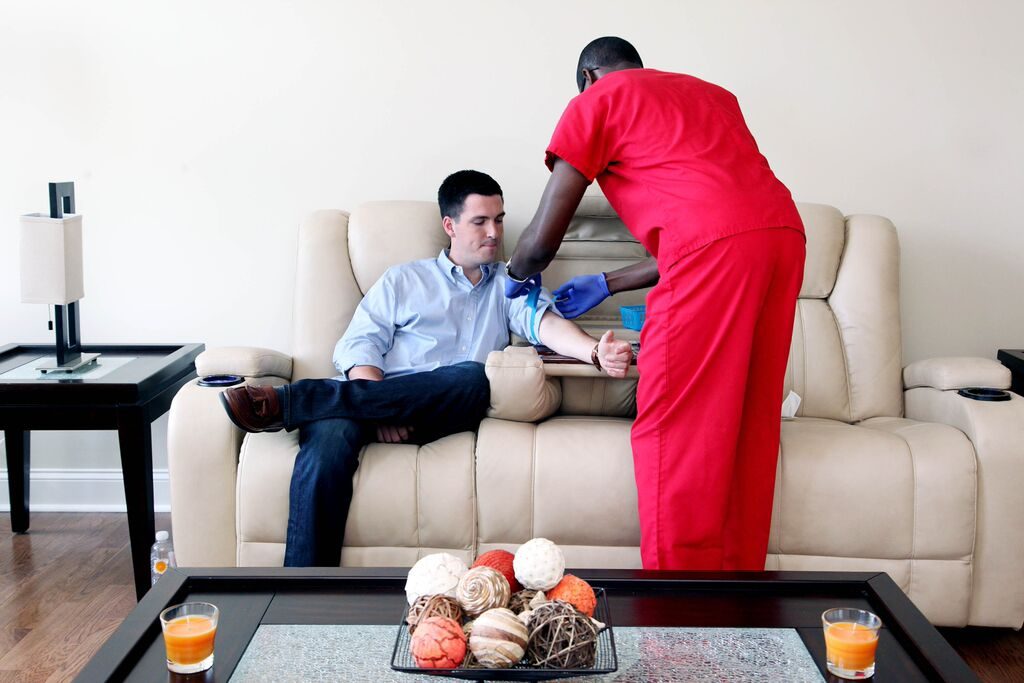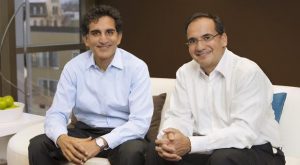The increased government scrutiny over the blood testing industry that caused one local company to stumble has led to the rise of another.
Iggbo, a local startup founded by Mark Van Roekel, Nuno Valentine and Shaiv Kapadia, wants to streamline the way blood samples move from patients to laboratories by connecting doctors with phlebotomists through a mobile app.
The company is tapping into an existing workforce of independent phlebotomists and connecting them with doctors and patients through an Uber-like system. The physician makes a blood draw appointment for the patient, phlebotomists in that area have the chance to accept or decline the request, and then once the blood is drawn, the sample is sent to a lab.
Iggbo launched in January and is now in 18 cities across the country, including Richmond, Los Angeles, Detroit, Seattle and New York City. Within the first 60 days, it contracted 3,000 phlebotomists.
The idea for Iggbo sparked shortly after Van Roekel and Valentine, co-founder of health tech firm C3 Nexus, met in July of last year.
“We sat in a bar for two hours and talked about all he was doing with C3, and this crazy idea he had about this thing that wasn’t even named Iggbo at the time, it was just a concept, and he said, let’s work together on this,” Van Roekel said.
Van Roekel has been working in tech-related ventures for more than 20 years, with companies like the Whitlock Group and Aperture Systems Integration. Valentine and Kapadia were the founders of C3 Nexus, a local company that uses technology to monitor patients once they leave the hospital after a cardiac event. Michael Willoughby is also a partner, with more than 20 years of experience in the lab industry.
That initial conversation took place about a month after it became clear that the medical laboratory industry needed a new way to get blood from the patient to the lab under stricter new federal guidelines.
The government issued a fraud alert in June of 2014, warning labs about paying doctors in exchange for ordering their blood tests. It was an industry-wide practice that largely involved paying so-called process-and-handling fees to doctors. The government questioned whether that practice constituted kickbacks.
The fraud alert directly impacted downtown-based Health Diagnostic Laboratory, which had used the fees as part of its fast-growing business model. A subsequent Wall Street Journal report highlighted a federal investigation into HDL, and the company eventually agreed to pay the government at least $47 million to resolve the investigation. It has since filed for bankruptcy and is pursuing a sale.
That’s where the four partners saw an opening to help connect the various parties involved in the blood draw process.
“The need was so apparent,” Van Roekel said. “This project bridged that gap and did it in a way that was well within the guidelines and regulations.”
Van Roekel called the new federal oversight a “wise decision.” Blood draws are part of 70 percent of patient diagnoses, he said. And considering that the healthcare industry accounts for about 17 percent of the nation’s GDP, then it follows that about 12 percent of the country’s entire GDP is substantially impacted by blood draws and laboratories.
“So the government really produced the opportunity (for Iggbo),” Van Roekel said. “And the government did the right thing, frankly. In the way it was set up before, there was a passive incentive that was in place for physicians to order more tests than they perhaps should because there was money to be had.”
Iggbo, like Uber, is a tech-based logistics company. It works by contracting with thousands of phlebotomists that are already working independently all over the country. Physicians using Iggbo’s app schedule appointments for their patients to get their blood drawn, and if the phlebotomist in that area accepts the appointment they can draw the blood, sometimes in the patient’s home or in the physician’s office, then ship the sample off to the lab.
The laboratories pay Iggbo for the service and cover the cost of delivery. In turn, Iggbo pays the contracted phlebotomists.
Typically, either lab companies or physicians are responsible for setting up blood draws and hiring phlebotomists. In that system, Van Roekel said many scheduled blood draws never take place because patients simply don’t show up for their appointments, so the whole process is plagued with inefficiency.
Van Roekel said Iggbo can benefit all parties involved: laboratories are able to reach a broader patient base, and the phlebotomists are able to increase their productivity. Physicians directly benefit from Iggbo because the app has an extensive reminder program that encourages patients to attend their appointments.
Van Roekel declined to share how much it cost to get Iggbo off the ground but said the company has a group of more than 10 investors, all located in Richmond. He said the investors were ready to fund the venture within two weeks of their first meeting.
“That is the fastest route to capital I’ve ever experienced,” he said. “That’s how compelling the concept is. And most of these guys are in non-related businesses and knew nothing about the healthcare industry.”
He also would not share Iggbo’s revenue numbers so far, nor how much the company is projected to bring in.
The company’s headquarters is in the same 4,500-square-foot space as C3 Nexus at 2575 Homeview Drive.
Van Roekel said Iggbo will remain headquartered in Richmond as the company grows and considers expansions into other areas of healthcare. And he said he does not expect the scrutiny that is on HDL to negatively impact Iggbo’s work, as the startup is largely focused on a national presence.
“We are in Richmond because we happen to live here, we want to employ people here and bring the service here,” Van Roekel said. “Outside of our little town here, the world really would never make the connection (with HDL).
He added that HDL is not one of the labs that has signed up to work with Iggbo at present, “though that is not to say that we wouldn’t do business with them in the future.”
The increased government scrutiny over the blood testing industry that caused one local company to stumble has led to the rise of another.
Iggbo, a local startup founded by Mark Van Roekel, Nuno Valentine and Shaiv Kapadia, wants to streamline the way blood samples move from patients to laboratories by connecting doctors with phlebotomists through a mobile app.
The company is tapping into an existing workforce of independent phlebotomists and connecting them with doctors and patients through an Uber-like system. The physician makes a blood draw appointment for the patient, phlebotomists in that area have the chance to accept or decline the request, and then once the blood is drawn, the sample is sent to a lab.
Iggbo launched in January and is now in 18 cities across the country, including Richmond, Los Angeles, Detroit, Seattle and New York City. Within the first 60 days, it contracted 3,000 phlebotomists.
The idea for Iggbo sparked shortly after Van Roekel and Valentine, co-founder of health tech firm C3 Nexus, met in July of last year.
“We sat in a bar for two hours and talked about all he was doing with C3, and this crazy idea he had about this thing that wasn’t even named Iggbo at the time, it was just a concept, and he said, let’s work together on this,” Van Roekel said.
Van Roekel has been working in tech-related ventures for more than 20 years, with companies like the Whitlock Group and Aperture Systems Integration. Valentine and Kapadia were the founders of C3 Nexus, a local company that uses technology to monitor patients once they leave the hospital after a cardiac event. Michael Willoughby is also a partner, with more than 20 years of experience in the lab industry.
That initial conversation took place about a month after it became clear that the medical laboratory industry needed a new way to get blood from the patient to the lab under stricter new federal guidelines.
The government issued a fraud alert in June of 2014, warning labs about paying doctors in exchange for ordering their blood tests. It was an industry-wide practice that largely involved paying so-called process-and-handling fees to doctors. The government questioned whether that practice constituted kickbacks.
The fraud alert directly impacted downtown-based Health Diagnostic Laboratory, which had used the fees as part of its fast-growing business model. A subsequent Wall Street Journal report highlighted a federal investigation into HDL, and the company eventually agreed to pay the government at least $47 million to resolve the investigation. It has since filed for bankruptcy and is pursuing a sale.
That’s where the four partners saw an opening to help connect the various parties involved in the blood draw process.
“The need was so apparent,” Van Roekel said. “This project bridged that gap and did it in a way that was well within the guidelines and regulations.”
Van Roekel called the new federal oversight a “wise decision.” Blood draws are part of 70 percent of patient diagnoses, he said. And considering that the healthcare industry accounts for about 17 percent of the nation’s GDP, then it follows that about 12 percent of the country’s entire GDP is substantially impacted by blood draws and laboratories.
“So the government really produced the opportunity (for Iggbo),” Van Roekel said. “And the government did the right thing, frankly. In the way it was set up before, there was a passive incentive that was in place for physicians to order more tests than they perhaps should because there was money to be had.”
Iggbo, like Uber, is a tech-based logistics company. It works by contracting with thousands of phlebotomists that are already working independently all over the country. Physicians using Iggbo’s app schedule appointments for their patients to get their blood drawn, and if the phlebotomist in that area accepts the appointment they can draw the blood, sometimes in the patient’s home or in the physician’s office, then ship the sample off to the lab.
The laboratories pay Iggbo for the service and cover the cost of delivery. In turn, Iggbo pays the contracted phlebotomists.
Typically, either lab companies or physicians are responsible for setting up blood draws and hiring phlebotomists. In that system, Van Roekel said many scheduled blood draws never take place because patients simply don’t show up for their appointments, so the whole process is plagued with inefficiency.
Van Roekel said Iggbo can benefit all parties involved: laboratories are able to reach a broader patient base, and the phlebotomists are able to increase their productivity. Physicians directly benefit from Iggbo because the app has an extensive reminder program that encourages patients to attend their appointments.
Van Roekel declined to share how much it cost to get Iggbo off the ground but said the company has a group of more than 10 investors, all located in Richmond. He said the investors were ready to fund the venture within two weeks of their first meeting.
“That is the fastest route to capital I’ve ever experienced,” he said. “That’s how compelling the concept is. And most of these guys are in non-related businesses and knew nothing about the healthcare industry.”
He also would not share Iggbo’s revenue numbers so far, nor how much the company is projected to bring in.
The company’s headquarters is in the same 4,500-square-foot space as C3 Nexus at 2575 Homeview Drive.
Van Roekel said Iggbo will remain headquartered in Richmond as the company grows and considers expansions into other areas of healthcare. And he said he does not expect the scrutiny that is on HDL to negatively impact Iggbo’s work, as the startup is largely focused on a national presence.
“We are in Richmond because we happen to live here, we want to employ people here and bring the service here,” Van Roekel said. “Outside of our little town here, the world really would never make the connection (with HDL).
He added that HDL is not one of the labs that has signed up to work with Iggbo at present, “though that is not to say that we wouldn’t do business with them in the future.”


